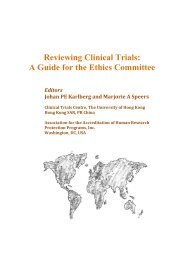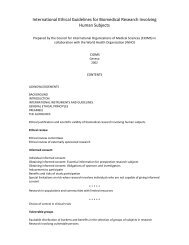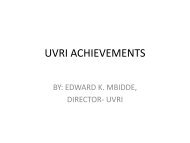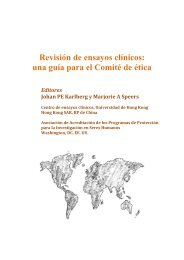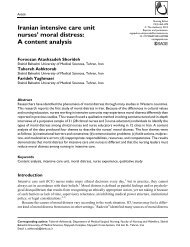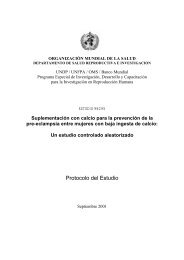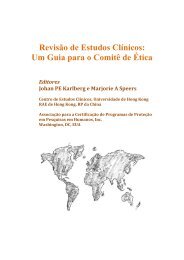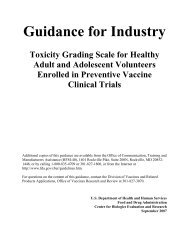03-00 THERAPY CHAPTER – INTRODUCTION - Global Health Trials
03-00 THERAPY CHAPTER – INTRODUCTION - Global Health Trials
03-00 THERAPY CHAPTER – INTRODUCTION - Global Health Trials
You also want an ePaper? Increase the reach of your titles
YUMPU automatically turns print PDFs into web optimized ePapers that Google loves.
they will help you achieve a result that is both valid and credible. This first meeting should also<br />
agree on the statistical warning rules and how everybody will act when they are triggered.<br />
Subsequent monitors’ meetings should be held when they can be most helpful to the trial. The<br />
second one could be held when patient recruitment is at a point where problems in accrual,<br />
eligibility, initial treatment, patient compliance, protocol adherence, data quality and timeliness,<br />
and the like can be identified and solutions suggested. Subsequent meetings might most<br />
sensibly be scheduled on the basis of study progression (such as when ½ the projected events<br />
have occurred, or when half of the projected follow-up has been reported) rather than on the<br />
passage of time (unless recruitment is lagging and the trial is bogging down).<br />
Typical agenda for a monitoring meeting<br />
The agenda for the Trial Monitoring Committee meetings that follow the fourth scenario observe<br />
the following sequence:<br />
1. A “closed” session among just the monitors, to identify concerns and other issues for<br />
discussion later in the meeting.<br />
2. An “open” session with the blinded Principal Investigator (perhaps accompanied by other<br />
members of the blinded Steering Group), the blinded Study Coordinator, and the<br />
unblinded Study Statistician(s). Patient accrual, data quality and timeliness, patient<br />
compliance and protocol adherence are usual topics, plus any other issues raised by,<br />
and appropriate for discussion among, blinded participants.<br />
3. A “semi-closed” session between the monitors and the unblinded Study Statistician(s), to<br />
examine and discuss unblinded data on safety and efficacy, and to determine the results<br />
of applying the statistical warning rules. This session often generates specific requests<br />
and recommendations that apply to just the Study Statisticians, and these are transmitted<br />
on the spot.<br />
4. A “closed” session among just the monitors, to discuss all the foregoing and to generate<br />
appraisals and recommendations for the study statisticians, the Principal Investigator,<br />
and the trial patients and staff.<br />
5. A final “open” session with everyone, to present, explain, discuss and (if necessary)<br />
revise monitors’ recommendations. The session closes with a decision on the timing and<br />
format (face-to-face or conference-call) for the next Trial Monitoring Committee meeting.<br />
Following such a Trial Monitoring Committee meeting, its chair drafts 2 letters. The first is for<br />
general distribution to all the trial participants, makes comments on its (blinded) progress, offers<br />
praise where deserved, and concludes that it should continue as planned. The second is for the<br />
blinded Principal Investigator and Steering Group, and includes recommendations about<br />
proposed protocol changes, recruitment, follow-up, and the quality and timing of field data. The<br />
Principal Investigator decides whether to forward this second letter to the sponsors.<br />
When the “semi-closed” session reveals that a statistical warning rule for safety, efficacy, or<br />
futility has been triggered, the “closed” session becomes a lengthy consideration of the totality of<br />
evidence for its completeness, consistency, sensibility, and coherence. If these criteria are met,<br />
the final “open” session unblinds the Principal Investigator. At that point the Principal Investigator<br />
assumes lead responsibility for deciding whether to stop the trial, involving Steering Group<br />
members and anyone else who could be helpful, and continuing to use the TMC as advisors.<br />
Page 6 of 7




